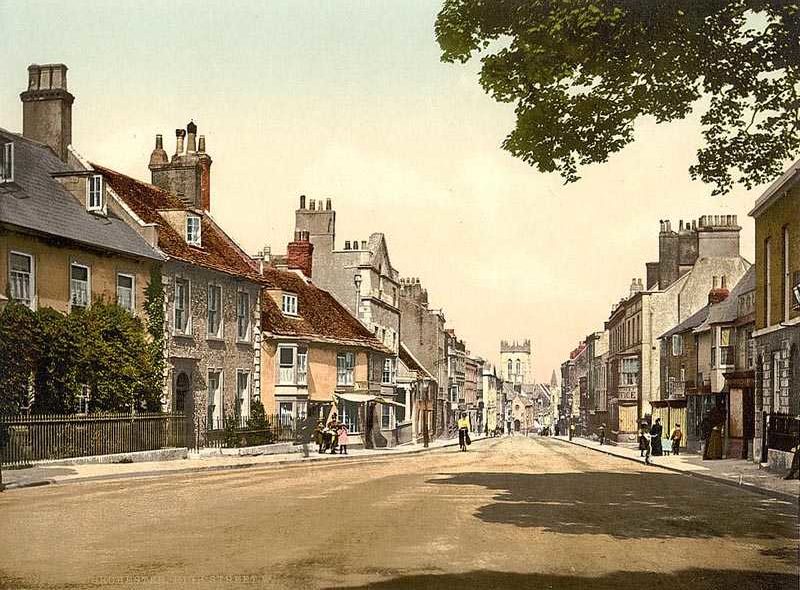Translation into Spanish of an extract from The Mayor of Casterbridge: The Life and Death of a Man of Character, an 19th century novel by the English novelist and poet Thomas Hardy. The novel was first published as a weekly serialisation as off January 1886 (in the periodical The Graphic) and later that year in book form. It is considered to be one of Hardy’s masterpieces, although it has been criticised for incorporating too many incidents, a consequence of the author trying to include something in every weekly published instalment. The story “tells of the rise and fall of Michael Henchard, who, starting from nothing after abandoning his wife and daughter, gains prosperity and respect and is reunited with his family only to lose everything through his own wrong-headedness, his vengeful nature, and a spate of bad luck.” Reference and movie with Spanish subtitles.
The Mayor of Casterbridge
These domestic exhibitions were the small protruding needlerocks which suggested rather than revealed what was underneath. But his passion had less terror for her than his coldness. The increasing frequency of the latter mood told her the sad news that he disliked her with a growing dislike. The more interesting that her appearance and manners became under the softening influences which she could now command, and in her wisdom did command, the more she seemed to estrange him. Sometimes she caught him looking at her with a louring invidiousness that she could hardly bear. Not knowing his secret it was cruel mockery that she should for the first time excite his animosity when she had taken his surname.
But the most terrible ordeal was to come. Elizabeth had latterly been accustomed of an afternoon to present a cup of cider or ale and bread-and-cheese to Nance Mockridge, who worked in the yard wimbling hay-bonds. Nance accepted this offering thankfully at first; afterwards as a matter of course. On a day when Henchard was on the premises he saw his step-daughter enter the hay-barn on this errand; and, as there was no clear spot on which to deposit the provisions, she at once set to work arranging two trusses of hay as a table, Mockridge meanwhile standing with her hands on her hips, easefully looking at the preparations on her behalf. (…)
Nance glanced triumphantly at Henchard, and sailed into the barn; for assuming that she was to be discharged on the instant she had resolved to make the most of her victory. Henchard, however, said nothing about discharging her. Unduly sensitive on such points by reason of his own past, he had the look of one completely ground down to the last indignity. Elizabeth followed him to the house like a culprit; but when she got inside she could not see him. Nor did she see him again that day. Convinced of the scathing damage to his local repute and position that must have been caused by such a fact, though it had never before reached his own ears, Henchard showed a positive distaste for the presence of this girl not his own, whenever he encountered her.
He mostly dined with the farmers at the market-room of one of the two chief hotels, leaving her in utter solitude. Could he have seen how she made use of those silent hours he might have found reason to reserve his judgment on her quality. She read and took notes incessantly, mastering facts with painful laboriousness, but never flinching from her self-imposed task. She began the study of Latin, incited by the Roman characteristics of the town she lived in. “If I am not well-informed it shall be by no fault of my own,” she would say to herself through the tears that would occasionally glide down her peachy cheeks when she was fairly baffled by the portentous obscurity of many of these educational works.
El alcalde de Casterbridge
Estos exabruptos domésticos representaban las sutiles exteriorizaciones emocionales que sugerían, pero no revelaban, el verdadero sentimiento que escondían. Pero esa intensidad no la aterrorizaba ni la entristecía tanto como su frialdad. La creciente frecuencia de esta actitud distante le daba a entender que cada vez sentía menos afecto por ella. En tanto su apariencia y sus modales se volvían más cautivadores gracias a su enorme voluntad de superación, más parecía estar alejándose de él. Algunas veces, lo descubría observándola con una desaprobación y un rencor imposibles de soportar. Y como desconocía su secreto, le resultaba cruel y ridículo que hubiera comenzado a tratarla con tanta hostilidad luego de haber empezado a llevar su apellido.
Sin embargo, el momento más sobrecogedor aún estaba por venir. Elizabeth había adoptado el hábito de ofrecerle un vaso de sidra o cerveza y pan y queso a Nance Mockridge, quien trabajaba en el patio aparvando el heno. Al principio, Nance aceptaba muy agradecida este pequeño detalle, pero, con el tiempo, pasó a formar parte de la rutina. Cierto día, Henchard se encontraba en el lugar y vio a su hijastra entrar al granero y desempeñar esta tarea. Como no había espacio libre para dejar las provisiones, la joven no dudó en buscar ella misma dos fardos y colocarlos a modo de mesa, mientras Mockridge esperaba de pie, con las manos en la cintura y observando a Elizabeth llevar a cabo dichas tareas en su honor. […]
Nance miró a Henchard con ojos de triunfo y caminó airosa hacia el granero. Imaginaba que después de esto la echaría de inmediato, por lo que había decidido aprovechar esta victoria al máximo. Henchard, sin embargo, no dijo nada al respecto. Sus propias experiencias del pasado lo habían marcado de tal modo que era demasiado sensible ante situaciones como esa; se lo veía completamente abatido y humillado. Elizabeth lo siguió hasta la casa con clara actitud de quien siente el peso de la culpa, pero cuando ingresó, no lo vio. Y tampoco volvió a verlo durante el resto del día. Convencido del terrible daño que un hecho de esas características habría seguramente provocado a su reputación y posición en esa localidad, si bien nada al respecto había nunca llegado a sus oídos, Henchard comenzó a demostrar un claro rechazo ante la presencia de la joven cada vez que se encontraba con ella. Cenaba con los granjeros en el salón de uno de los dos principales hoteles y la dejaba en completa soledad. Si hubiera podido ver a qué se dedicaba durante esas horas tranquilas, quizá no habría juzgado su forma de ser y proceder de esa manera. Elizabeth leía, tomada notas sin parar y asimilaba datos y hechos, con notable esfuerzo, es verdad, pero sin perder jamás su objetivo de vista. Motivada por el estilo romano del pueblo donde vivía, había comenzado a aprender latín. “Si no estoy bien informada, no será por decisión propia”, solía decirse a sí misma entre lágrimas cuando se sentía abrumada por la portentosa dificultad de varias de las metas de aprendizaje que se proponía.

